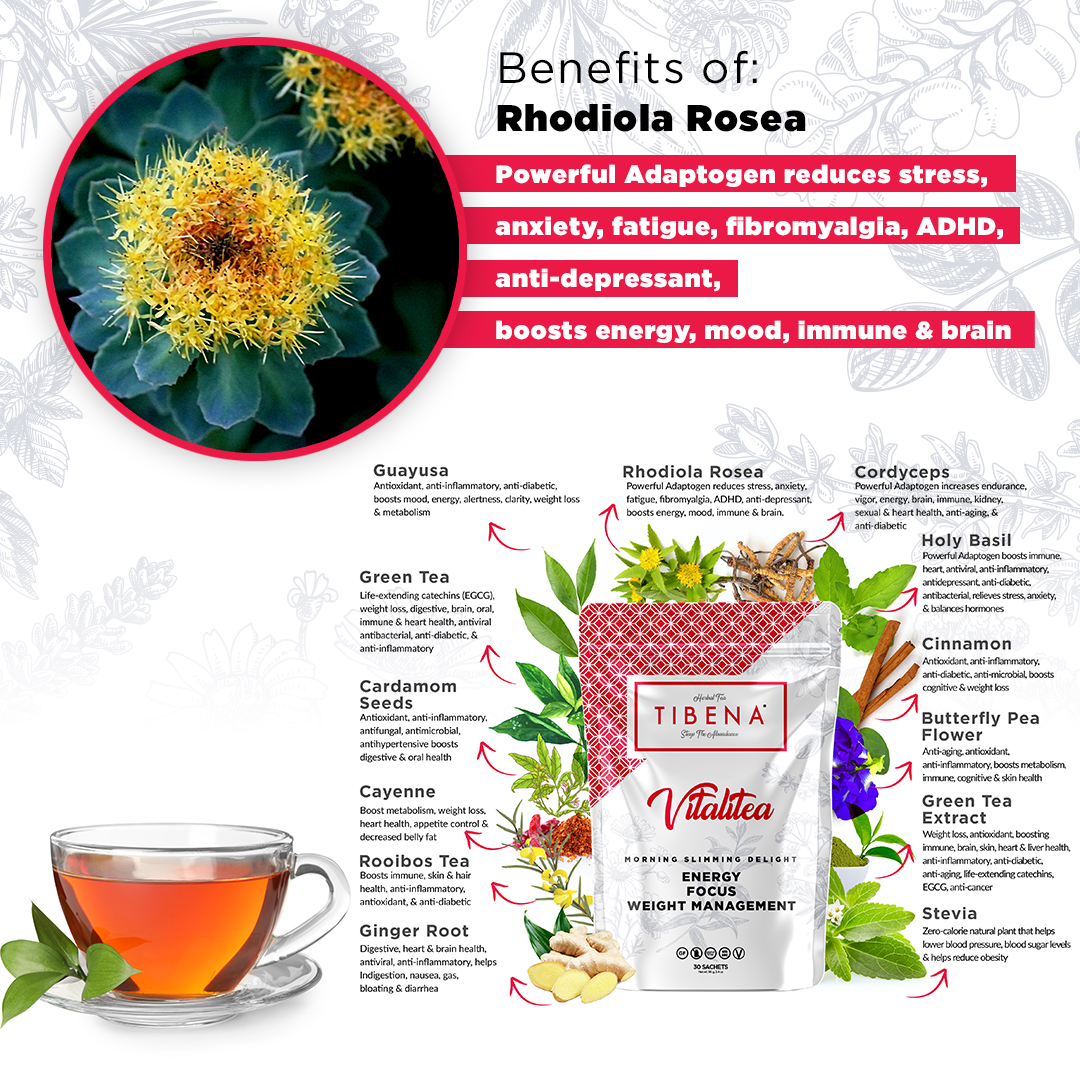
Studies have shown Potential Benefits:
Powerful Adaptogen reduces stress, anxiety, fatigue, fibromyalgia, ADHD, mild to moderate depression & boosts energy, mood, immune & brain
Rhodiola Rosea
Powerful Adaptogen
Adaptogens are non-toxic plants that help the body resist stressors of all kinds, whether physical, chemical or biological. These herbs and roots have been cherished for centuries in Chinese and Ayurvedic healing traditions.
Rhodiola Rosea called Rhodiola and known as “rose root,” “golden root” or “arctic root” in the mountainous parts of Europe and Asia, has long been employed in Eurasian traditional medicine as a natural tonic, referred to as an “adaptogen.” Throughout Russia, is listed as an adaptogen, nervous system tonic and antidepressant. (Russian Pharmacopeia, 1969) Rhodiola Rosea contains Rosavin that can help balance the stress hormone, cortisol.
Powerful Adaptogen that boosts energy, mood, immune, reduces stress & anxiety, combats fatigue, fibromyalgia, ADHD, increases mental performance, neuro-protective, relieves mild to moderate depression

https://www.ncbi.nlm.nih.gov/pmc/articles/PMC5370380/ – – It improved stress and depression.
https://pubmed.ncbi.nlm.nih.gov/26502953/ – reduced stress and anxiety – Rhodiola has long been known as an adaptogen, a natural substance that increases your body’s resistance to stress in non-specific ways.
https://pubmed.ncbi.nlm.nih.gov/29325481/ – Consuming adaptogens during stressful times helps you handle stressful situations better – Rhodiola rosea extract (RRE) fulfils important requirements. It is the main adaptogen approved by the HMPC/EMA for the indication ‘stress’ and influences the release of stress hormones while boosting energy metabolism as revealed in animal literature. RRE offers comprehensive treatment of stress symptoms and can prevent chronic stress and stress-related complications.
https://pubmed.ncbi.nlm.nih.gov/30393593/?from_term=rhodiola+rosea&from_pos=10 – Botanical antidepressant
https://pubmed.ncbi.nlm.nih.gov/22228617/ – In this human study, Rhodiola was given twice a day for 4 weeks, improved symptoms associated with daily stress. The participants reported less fatigue, reduced stress symptoms & improved cognitive function. Significant improvements in symptoms of stress, fatigue, exhaustion & anxiety – tests showed improvements with regard to stress symptoms, disability, functional impairment & overall therapeutic effect. Improvements after 3 days of treatment, and continued improvements after 1 & 4 weeks.
https://pubmed.ncbi.nlm.nih.gov/19016404/ – Randomized, Double Blind, Placebo-Controlled, Parallel-Group Study of the Standardized extract SHR-5 of the roots of Rhodiola rosea in the treatment of subjects with stress-related fatigue. Rhodiola Rosea exerts an anti-fatigue effect that increases mental performance, particularly the ability to concentrate, and decreases cortisol response to awakening stress in burnout patients with fatigue syndrome. They experienced significant improvements in stress symptoms, fatigue, quality of life, mood and concentration. Those receiving the herb had significant improvements in mental performance, decreased cortisol levels, & a reduced feeling of being “burned out”.
https://pubmed.ncbi.nlm.nih.gov/19168123/ – Rhodiola rosea L. roots have potent anti-depressant activity by inhibiting MAO A and may also find application in the control of senile dementia by their inhibition of MAO B.
https://www.mhanational.org/rhodiola-rosea – Studies document rhodiola’s impact on an individual’s overall general physical and mental health. Rhodiola can be used to reduce stress, combat fatigue, increase mental performance and improve physical and mental fitness and resilience.
https://bmccomplementmedtherapies.biomedcentral.com/articles/10.1186/1472-6882-12-70 – Physical/mental fatigue reduced
https://onlinelibrary.wiley.com/doi/epdf/10.1111/j.1541-4337.2005.tb00073.x – Rhodiola Rosea has adapted to the harsh conditions of high altitude (extreme cold, low oxygen, little rainfall, and intense irradiation from the sun) by producing a group of powerful protective compounds that have diverse beneficial effects in animals and humans. Used in Greek medicine 2000 years ago & today by 21st-century cosmonauts. It is time for modern research, using controlled clinical trials, to develop the potential medical applications for this unique phyto-adaptogen. There is immense potential to develop herbal preparations,from this unique herb from high altitudes. Its potential for development of radioprotectants – needed in today’s world—is immense. Promotion of its production and protection would be beneficial to society. Adaptogenic, stress, antioxidant, anticarcinogenic, cardioprotective, endocrine, reproductive, neuro-health, physical.
https://www.ncbi.nlm.nih.gov/pmc/articles/PMC6208354/?mc_cid=786a6a370a&mc_eid=84fc908f57 – boosts energy, mood and immune health, relieves fatigue, depression, anti-aging and anti-cancer
https://www.nccih.nih.gov/health/rhodiola – Rhodiola overview
https://www.ncbi.nlm.nih.gov/pmc/articles/PMC3541197/ – Rhodiola was first studied by the Russians during the cold war era. Rhodolia was noted for endurance, focus, antioxidant brain health & anti-carcinogenic.
https://www.annualreviews.org/doi/10.1146/annurev.pa.09.040169.002223 – Adaptogens, non-specific response
https://pubmed.ncbi.nlm.nih.gov/27013349/ – Depression
https://pubmed.ncbi.nlm.nih.gov/20378318/ – Rhodiola Rosea has robust traditional and pharmacological evidence of use in fatigue, and emerging evidence supporting cognition and mood.
https://pubmed.ncbi.nlm.nih.gov/30393593/?from_term=rhodiola+rosea&from_pos=10 – anti-stress, anti-aging, boosts immune
https://pubmed.ncbi.nlm.nih.gov/25837277/?from_term=rhodiola+rosea+double+blind+studies&from_pos=3 – helps relieve mild to moderate depression
https://www.sciencedirect.com/science/article/abs/pii/S0965229918307465 – the adaptogenic and antidepressant effects of Rhodiola Rosea on neuroplasticity in humans.
https://www.sciencedirect.com/science/article/abs/pii/S0944711316000519 – R. rosea demonstrates multi-target effects on various levels of the regulation of cell response to stress, affecting various components of the neuroendocrine, neurotransmitter receptor and molecular networks associated with possible beneficial effects on mood.
https://www.sciencedirect.com/science/article/abs/pii/S094471131000036X – fatigue, cognition & mood
https://pubmed.ncbi.nlm.nih.gov/3751623/ – shown to enhance the central nervous system, improve learning & memory, boost mood & act as a neuroenhancer, & inhibit aging of the brain.
https://pubmed.ncbi.nlm.nih.gov/15256690/ – Rhodiola Rosea can improve endurance exercise performance. In this double-blind, placebo controlled, randomized study, Rhodiola was found to enhance exercise capacity in healthy young test subjects. Improvements were noted in muscle strength, speed of limb movement, reaction time & attention span.
https://pubmed.ncbi.nlm.nih.gov/28219059/ – Chronic fatigue syndrome is a persistent & challenging condition to treat. In this preliminary clinical trial, people took 200mg of Rhodiola extract over 8 weeks. Fatigue symptoms decreased significantly.
https://pubmed.ncbi.nlm.nih.gov/12725561/ – Military cadets were either given a placebo or one of two different doses of Rhodiola. Cadets in the two groups that received the Rhodiola had significantly reduced levels of fatigue compared to those taking the placebo.
